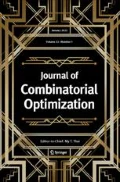Abstract
In a hospital, the nursing assistants in wards are always responsible for delivering patients to do some medical examinations, and the nursing assistants in the medical departments need take these patients back to the corresponding wards after examinations. We transform this actual problem about nursing assistants’ daily work into a three-stage supply chain scheduling problem if patients are regarded as jobs, the ward as the customer, the nursing assistants as vehicles and the medical department as the processing machine in the factory. The capacity of each vehicle is limited because the nursing assistant only can deliver several patients once. And the transportation schedule back and forth between the customer and the factory are the same in view of the actual arrangement. In order to reduce the average consumption time of patients, the objective is to minimize the total flowtime, that is, the sum of arrival time of every completed job back to the customer. We show that the problem is NP-hard in the strong sense, and provide an approximation algorithm with the performance ratio of 2. Moreover, we study some polynomially solvable cases of the problem.
Similar content being viewed by others
References
Besbes W, Teghem J, Loukil T (2016) Minimizing the maximum lead time in a 3-stage supply chain scheduling problem. META2016
Chen ZL (2010) Integrated production and outbound distribution scheduling: review and extensions. Oper Res 58:130–148
Chen B, Li X (2018) Training and management for nursing assistants. J Pract Med Tech 25:921–922
Chen L, Zhang J, Fu W (2018) Health-promoting lifestyles and their related influences among nursing assistants in nursing homes in China. Appl Nurs Res 39:97–102
Du G, Zheng LY, Ouyang XL (2019) Real-time scheduling optimization considering the unexpected events in home health care. J Comb Optim 37:196–220
Fan J, Lu XW (2015) Supply chain scheduling problem in the hospital with periodic working time on a single machine. J Comb Optim 30:892–905
Hall NG, Potts CN (2003) Supply chain scheduling: batch and delivery. Oper Res 51:566–584
Hu J-L, Zha C, Jiang Y-W (2012) Approximation algorithms for a three-stage supply chain scheduling problem. J Zhej Sci-Tech Uni 29:709–713
Kanaskie ML, Snyder C (2018) Nurses and nursing assistants decision-making regarding use of safe patient handling and mobility technology: a qualitative study. Appl Nurs Res 39:141–147
Li WH, Chai X (2019) The medical laboratory scheduling for weighted flow-time. J Comb Optim 37:83–94
Li CL, Ou JW (2005) Machine scheduling with pickup and delivery. Naval Res Logist 52:617–630
Lu VM, Wu JH, Chen T, Shi H (2017) Management on transportation team. Chin Tra 337:339–340
Su HQ, Wan GH, Wang S (2019) Online scheduling for outpatient services with heterogeneous patients and physicians. J Comb Optim 37:123–149
Wang DY (2015) Minimizing the maximum lead time in a 3-stage supply chain scheduling problem. Int J Ind and Sys Eng 19:94–122
Wang X, Cheng TCE (2009) Production scheduling with supply and delivery considerations to minimize the makespan. Eur J Oper Res 194:743–752
Wang YD, Fan BQ, Zhai AG, Xiong W (2019) Two-machine flowshop scheduling in a physical examination center. J Comb Optim 37:363–374
Yang Y, Luo SC, Fan J, Zhou XY, Fu CY, Tang GC (2019) Study on specialist outpatient matching appointment and the balance matching model. J Comb Optim 37:20–39
Yao K, Zhao K, Jiao FY (2018) Investigation and countermeasures on nursing assistant standardization in Beijin. Chin Hosp 22:43–45
Zhang F, Li J, Fan JX, Shen HL, Shen J, Yu H (2019a) Three-dimensional stable matching with hybrid preferences. J Comb Optim 37:330–336
Zhang L, Zhang YZ, Bai QG (2019b) Two-stage medical supply chain scheduling with an assignable common due window and shelf life. J Comb Optim 37:319–329
Zhong LW, Bai YQ (2019) Three-sided stable matching problem with two of them as cooperative partners. J Comb Optim 37:286–292
Zhong LW, Luo SC, Wu LD, Xu L, YangJ H, Tang GC (2014) A two-stage approach for surgery scheduling. J Comb Optim 27:545–556
Acknowledgements
This research is supported by National Natural Science Foundation of China “The research on supply chain scheduling problems with unavailability constraints” (No. 11601316). The first author is also supported by the key discipline “Applied Mathematics”of Shanghai Polytechnic University (No. XXKPY1604), Research Center of Resource Recycling Science and Engineering, and Gaoyuan Discipline of Shanghai – Environmental Science and Engineering (Resource Recycling Science and Engineering) of Shanghai Polytechnic University.
Author information
Authors and Affiliations
Corresponding author
Additional information
Publisher's Note
Springer Nature remains neutral with regard to jurisdictional claims in published maps and institutional affiliations.
Rights and permissions
About this article
Cite this article
Fan, J., Shi, H. A three-stage supply chain scheduling problem based on the nursing assistants’ daily work in a hospital. J Comb Optim 42, 896–908 (2021). https://doi.org/10.1007/s10878-019-00500-3
Published:
Issue Date:
DOI: https://doi.org/10.1007/s10878-019-00500-3




